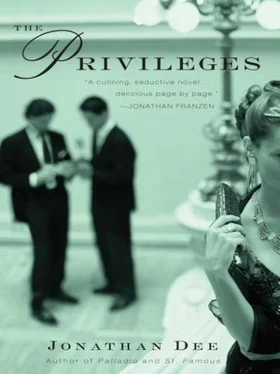He took a break and pulled a ten-dollar bottle of water out of the minibar. He drank it in front of the dark window, his chest still heaving; my God, Cynthia thought, he is so fucking gorgeous. She rolled over onto her stomach on the oversize bed. It was a long way from their wedding night, passed out from fatigue in that kitschy little B and B in Pittsburgh; she surprised herself by even remembering it. But when you did remember it you had a hard time not feeling optimistic. Things had been getting better the last few months. Adam was doing really well. He’d started trading on the side, he said, and suddenly there was money for everything. They were going to Vail in February, and to the Caribbean in the spring. The new apartment was going to be amazing. Sanford’s wife had asked her to join the Coalition for Public Schools. That had to be Adam’s doing too, of course. And what he kept telling her all these months was absolutely right: you just needed to get out into the world a little more. She felt his fingers on her calf and turned around to see him smiling sweetly at her. “Okay, shorty,” he said. “Break time’s over.”
He kept telling her how much he loved her, and she would turn her face away when he said it for fear she would start crying. He came again and went directly to the bathroom: “Just checking for a defibrillator,” he said. The door closed. Cynthia lay staring at the ceiling; after a minute she rolled to the edge of the bed and walked somewhat stiffly to the chair by the window where she’d dropped her bag. The room was huge, with a stunning view from the foot of Central Park. Cynthia thought she might even be able to see their apartment from there, but they weren’t quite high up enough. No voice mail on her phone, but in her bag she found three tightly folded pieces of lined paper — notes to her that Jonas must have slipped in there just before they left the apartment. The first two said “Love U” and “Miss U,” and the third one said, “R U winning?”
She was still looking at them when Adam came up behind her. She was worried he’d be angry at her, but of course he wasn’t. He was perfect. “Maybe,” he said, and kissed her neck, “we should just head home.”
They called Gina from the sidewalk outside the hotel so she wouldn’t panic when she heard their key in the door. Adam took her downstairs to put her in a cab; Cynthia slipped off her shoes and went into the kids’ bedroom. Jonas was sleeping on his stomach as he always did, the covers kicked off, one palm flat against the mattress as if it were a pane of glass. She sat on the floor, against the wall across from his bed. In the dark the room was a comforting weave of long shadows, from the dresser, from the window frame, from the rolling backpack full of April’s schoolbooks that sat beside the door. She held her breath for a moment until she made out their own.
It made sense, she supposed, that the kids were a little nervous about moving into a new place, and a little nostalgic too. Everything that had ever happened to them had happened here. But she was flat faking it when she pretended to share their feelings about saying goodbye to this apartment. She never thought this was going to be their last home. To tell the truth she didn’t think the next one would be their last either. It was a vaguely shameful thing to admit. But there was always that moment when you fell out of love with a place, when you looked it over and asked yourself if it was so unimprovable that you wouldn’t mind if you died there. Once that thought lodged itself in your head, forget it, it was over.
Not the kind of reasoning you could share with kids that age, obviously. Jonas had already gone through a brief obsession with death, when he was just three. Cynthia was never sure what triggered it — probably some story she’d read to him, though she couldn’t think which one — but one day he was just aware of death, and he had trouble grasping some of its basic tenets. To him it amounted to being paralyzed, eyes open, inside a coffin, forever. The absence of consciousness was literally unimaginable. He believed the dead could still see, for instance — it was just too dark for them to see anything. Distinctions like that were not anything Cynthia wanted to get into with him.
She tried what she could think of. She had him pull out his toy cash register. “How many days until your birthday?” she said.
“Fifty-six,” Jonas said, who knew this because he asked about it every day.
“And is that a little or a lot?”
“A lot !”
She thought a moment, then punched some figures into the beeping cash register. “This is how many days until you’re Grandma Morey’s age,” she said. “And even Grandma isn’t dying anytime soon.” Her own mother was older than Adam’s, but she didn’t use Grandma Ruth as an example because Jonas hadn’t seen her in so long Cynthia thought she might not seem sufficiently real. She turned the numbers toward him.
“Wow!” he said. But she should have known that wouldn’t work: at that age, any number over one hundred was the same in his mind, and anyway to tell a child that he shouldn’t be afraid of something yet was no kind of advice at all.
“It’s all a part of nature,” she said another time. “Every living thing is born, and grows, and dies. Every single animal and plant and bird and flower and tree. It’s what’s called,” she said, hating herself, “the circle of life.”
“So you’ll die? And Daddy? And April? When?”
“No,” she said, panicking. “Mommy and Daddy are not going to die. You don’t even need to worry about that. Just put that thought right out of your head.” She pantomimed plucking a bad thought out of her own head and sniffing it and throwing it away, which made him laugh, and then she let him watch TV.
“He’ll move on,” Adam had said. “He’s three. Something else interesting will come along and bump it right out of his head. I remember going through a phase like that when I was around his age.”
“You did? What did your mother tell you?”
He thought. “I have absolutely no memory of it.”
“So you recall asking the question. It’s just that your mother said nothing worth remembering.”
He nodded.
“Well, there you have it,” Cynthia said.
Then one day the preschool called; they had her come pick Jonas up early because after snack time he had just started crying. He wouldn’t discuss what was bothering him. Probably just tired, the teacher said with that slightly lunatic patience you wanted in a preschool teacher, but all the same maybe she ought to come and get him.
She took him home in a cab, stroking his hair and kissing the top of his head, not asking any questions. She was trying to soothe herself as much as him. Who is this boy? she said to herself. Why is there no one to help me? How am I supposed to know what to do?
When they walked in the front door, she said, “We have to go get April in about an hour. You want a snack and I’ll read to you?”
“Mommy?” he said. “I don’t want to die because when you’re dead you can’t talk or get up and I’ll miss you.”
And here she learned a lesson about desperation and the ways in which a parent could sometimes rely on it. “Come here,” she said. He sat on her lap. She told him that he was a big boy and it was time for the truth. The truth was that no one knows what happens after we die, because we can’t talk to dead people and dead people can’t talk to us. But some people have some ideas about what might happen. Some people believe in an idea called reincarnation, where when one life ends there’s a little rest time and then you get to come back and live again; not the same exact life, though, and maybe not even the same kind of life — maybe you came back as an eagle, or a dog. In fact, maybe this life, right now, wasn’t even his first one: maybe he’d been a dinosaur, so long ago that he’d forgotten. (She could feel his little arms relaxing.) Another idea, which a whole lot of people believed in, was called heaven. Heaven was a place that depended on your wishes: the place in life when you’d felt safest and happiest and most comfortable, heaven was that place for you all the time, forever.
Читать дальше












